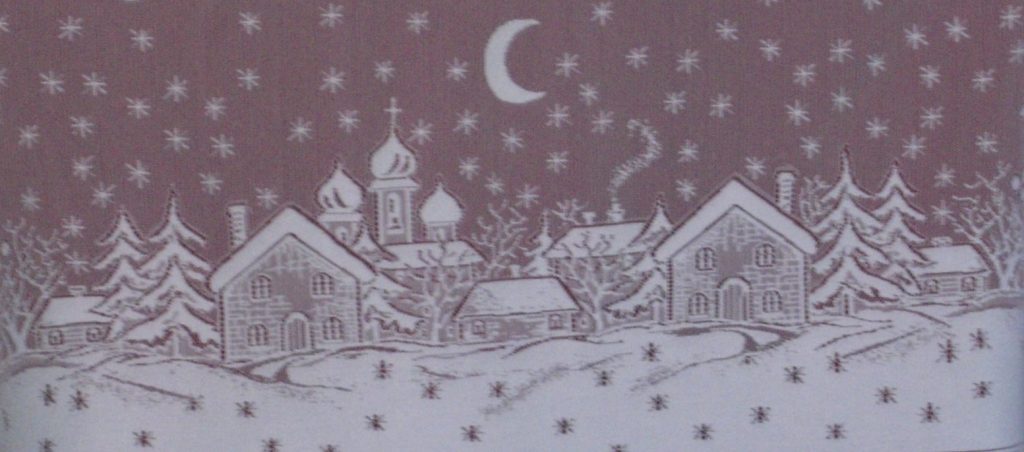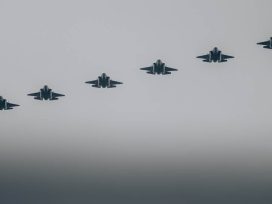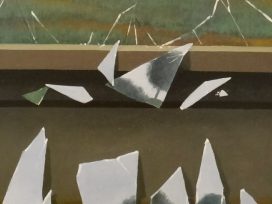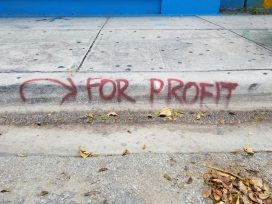James Joyce was right: History was the nightmare I was trying to escape when I fled New Jersey for Boston. It wasn’t easy. A garrulous guest, History had been joining us for dinner for as long as I could remember. Sitting down at 4:00 p.m., so that my father could eat with us before heading to work second shift at the Anheuser-Busch plant in Newark, my sister and I would listen to tales of a lost world. Presiding silently at the head of the table, wearing a jacket and tie, my grandfather, would wink at us, acknowledging our bewilderment without interrupting our parents’ rehearsal of all that had been lost to war – friends, family, home, a country. Occasionally he would add a story of his own.
We knew, for example, that, after serving in the Austro-Hungarian army during the First World War, for which he’d interrupted his graduate studies in Byzantine Art and Art History at the University of Vienna, he’d returned to Ukraine to do archeological field work documenting the Scythian presence around Odesa. There he was arrested by the Bolsheviks. One morning he was lined up with other Ukrainian prisoners before a firing squad. When he heard the guns go off, he dropped to the ground. His would-be executioners were drunk, he explained. After discharging their rifles, they walked away, leaving the bodies where they fell. My grandfather escaped. He made his way to St. Petersburg where, the story goes, he met with Trotsky who permitted him to ride with the Bolsheviks to make sure the most precious icons weren’t damaged as they looted Ukraine’s churches. Did this really happen? I know this last detail only from a funeral oration delivered after my grandfather’s death by one of his students.
History loves the dead.
* * *
My grandfather eventually returned to Peremyshl, an ancient city with a mixed Polish, Ukrainian, and Jewish population. Its roots dated back to the eighth century, with evidence of a Christian monastic settlement on the site by the ninth century – a hundred years before the baptism of Kyiv. My grandfather’s mother was Polish – a member of what was known as “mala shlachta”, petty gentry, a fact on which my mother prided herself, lording it over my father, a lowly member of the business class from Czernivtsi. My grandfather and his brother assumed Ukrainian identities; their sister Sabina identified as Polish – as was the common practice at that time. They were indeed prominent citizens in a city central to Ukrainian cultural evolution. “The signs of growing interest in the cultural aspects of nationhood”, writes the historian Orest Subtelny, “appeared in the early 19th century in the ancient city of Peremyshl, the seat of the Greek Catholic eparchy, site of a lyceum and rich libraries, and the homes of some of the most sophisticated members of the Ukrainian clergy.”
My grandfather, who never finished his thesis on Byzantine Art, began teaching in one of the city’s two Ukrainian-language high schools. There he advised his students to study rather than waste time politicking.
Grandfather’s stories were hardly unique. Every older member of our large extended family had similarly harrowing briefs. One uncle had spent a couple of years in Siberia before being released so that he could join in the fight against Hitler after the collapse of the Soviet/German alliance.
Hearing these stories in the disjunctive calm of suburban New Jersey, my sister and I were unsure of how to relate to this terrible lost world. It sounded like a good place to leave. Yet, given how badly our parents wanted to return, there was clearly more to it. Attachment to childhood memories was surely part of it, of course. My mother loved recalling the summers she spent on her grandfather’s farm in Laskivci where she would arrive from the train station in a “britchka” – a small, horse-drawn carriage. But, over time, I understood that what they really missed was the richness of the culture which had shaped them: music, ranging from folk songs to the classical compositions of Lysenko and Lyudkevich; poetry, not only Shevchenko and Franko (with whom my grandfather studied) but also of the writers of the 1930s, most of whom who died violent deaths during Stalin’s reign of terror and who constitute a group known collectively as “the executed renaissance”. Then came the poets and fiction writers of the sixties – many of whom were so-called dissidents – whose works my parents bought and my mother read: Vasyl Stus, Ivan Drach, Lina Kostenko, Oles Honchar, Mykola Rudenko, Ivan Dziuba, and many others. Whenever one of them was arrested my sister and I would join our parents at protest marches in front of the UN or outside the Soviet embassy in New York or Washington.
The vivid and at times overwhelming histories we heard at home had little resonance in the outside world. There, Ukraine did not exist except as a subset of Russia. Our schoolteachers didn’t care to hear our stories. The cultural sensitivity so widespread (if endangered) today was still decades away. We were expected to assimilate and join the consumer culture – or so it appeared. Watching the Cosby Show, I longed for the normalcy evinced by that model African-American household.
I had not yet absorbed one of literature’s primary lessons: appearances deceive.
At the height of the Cold War, public perceptions were fuelled by a well-funded Soviet disinformation apparatus, and supported by the animus of many red-diaper babies. I was repeatedly told that Ukraine didn’t exist and, at the same time, that all Ukrainians were Nazis. This state of affairs lasted well-into the nineties and only began shifting gradually after Ukraine declared independence.
Having to persuade others that one exists, and is not the child of Nazis, grows old fast.
One evening in the fall of 1994 I was watching the popular television news program Sixty Minutes alongside my wife when Morley Safer, one of the program’s hosts, floated the idea that perhaps all Ukrainians (who didn’t really exist) were genetically antisemitic.
I couldn’t help recalling my mother’s stories – not only the ones rehearsed over the dinner table but the more detailed ones I had translated myself back in the seventies so she could read them out at synagogues, where she was a regular invited speaker.
In her talks, she described how her life changed in 1939, when the Germans advanced east: “In the early days of the war, when the Germans began bombing the city centre, my mother took her children to wait out the attack at the home of the Sheflers, who lived on the outskirts of the city. When the presence of military barracks nearby made even that area into a target, Mother gathered up the family and, in the company of Mrs. Shefler and her children, moved to a neighbouring village where they passed the critical period in the home of an acquaintance. When the fighting subsided, both families returned to their respective homes.”
She goes on to describe the two families’ relationship in warm detail. From 1923 to 1929 the families were neighbours: “We normally spent the holidays (Rosh Hashanah, Yom Kippur, Purim) with the Sheflers. The older Sheflers were orthodox and adhered to the law. Their sons, on the other hand, entertained more modern opinions – which their parents tolerated only grudgingly. All four of the boys – Samyk, Vilyk, Mundek, and Edek (Izydor), attended the Ukrainian high school … After we moved, Mrs. Shefler and my mother continued visiting each other. Mrs. Shefler often complained that Edek, who was very handsome, was always dating Ukrainian girls. Because the Sheflers were people of modest means, Edek wasn’t able to attend university. Instead, he too went to work. Moreover, in 1936, his father died, after which his two older brothers married and moved to other cities while he and his brother Samyk stayed to care for their mother.”
She goes on to describe the brutality of the Soviet regime. There wasn’t a Ukrainian family who didn’t have at least one of its members arrested or deported. A cousin, as well as her father’s brother-in-law, were both killed by the Bolsheviks. Her younger brother was arrested and disappeared. Among the Polish intelligentsia, too, many judges and high-ranking military officers had been murdered or exiled to Siberia.

Ukrainian tablecloth. Image by Billie K67 via Flickr
In 1942 my mother dropped out of university to attend to her dying mother, as well as to care for her six-year-old sister (my aunt, who witnessed all this, is 87, and lives just outside Washington D.C.). By then one part of the city had been partitioned with barbed wire and turned into a ghetto. Jews were forced to wear armbands emblazoned with the Star of David.
Then the Germans began transporting the older people out of the ghetto. My mother recounts stories about friends who came seeking help. Among them were the Koestlers, who’d obtained two forged IDs and wanted to get to Warsaw but feared someone at the train station might recognize them as they were buying tickets. They stayed the night and the next day my mother and uncle bought their tickets and escorted them to the train: “Eventually we received a coded telegram from Warsaw: ‘Aunt is well.’ We later learned they survived the war.” There was Dr. Kuba-Reinbach, who hid with them for three weeks before being spirited out of the city by friends. And then there were the Sheflers.
* * *
These memories, this ancient history, flares up now of course because of Putin’s mad nonsense about “denazification”. Eight million Ukrainians were killed in World War II (among them, 600,000 Ukrainian Jews). This was on the heels of Stalin’s genocidal famine of 1932-33 which had cost some five million lives. An additional two and a half million Ukrainians were deported to work camps in Germany. The combined losses of France, Italy, the UK, and the US in that war totalled around two million. And Putin’s canard about Ukraine as a nation of Nazis deserves to be answered.
* * *
My mother’s story continues:
“One evening, around curfew, we were all home except for Father, who always arrived late from his committee meetings, when the doorbell rang. ‘Who’s there?’ I asked. A voice at once strange and familiar whispered: ‘Helen, hand me the key to the cellar. It’s me, Edek. I’m with my wife’ (we hadn’t heard that he’d gotten married while in the ghetto). I opened the door and in the dim light spilling out of the hallway I saw a horrifyingly pale face which in no way resembled the handsome man I knew so well. I froze. ‘It’s me alright. Give me the key.’ I took a deep breath, turned and went to get the key. I told my brother Orest who was at the door. Orest led the Sheflers to the cellar. When Father returned, we explained what had happened. He told Orest to bring them up at once.”
The Germans had begun killing the ghetto’s residents then transporting the bodies out at night and dumping them in the Jewish cemetery. Edek and his new wife, Esther, pretended they’d been shot. They were thrown onto a truck full of corpses and dumped into a mass grave out of which they later crawled.
Their mother had already been deported (they learned later that she’d been killed). Samyk was still in the ghetto. Edek didn’t know the whereabouts of his two older brothers. My mother recalled Edek saying: “Professor, you are our father now. You must decide what to do with us. This is my young wife, Esther. We were married not long ago and haven’t begun to live yet and now it seems it’s time for us to die.”
My uncle set about creating a secret space in the pantry by blocking a part of it off with a bookcase. There the Sheflers hid and slept.
Maintaining silence about their presence posed a challenge. In fact, my mother did tell her closest friends so that they understood the risk they took visiting. Only my aunt Christine, six years old at the time, managed to keep the secret.
The police station was directly across the street.
At one point Maria, the housekeeper, threatened to turn the family in, relenting only after my uncle pointed out that the Germans would see her as complicitous and would surely execute her as well. Then there was “Captain Violin”, a Gestapo officer who came to play the violin, accompanied by my mother on the piano. He and my grandfather had served together in the Austro-Hungarian Army. The Captain had no idea that the Sheflers were among his audience. My mother always credited her father’s deep faith for protecting them.
As the Bolsheviks approached, my grandfather learned that his name was on the list of those scheduled for deportation, or worse: “We had to leave before the Bolsheviks returned. We packed the most valuable among Father’s books and brought them to the Bishop’s Palace for safekeeping. We gathered a few necessary items and left on the last civilian train from Peremyshl to Krakow, where Father’s brother lived. We were sorry to say goodbye to the Sheflers and we were uncertain whether we would ever see each other again.”
“… The Sheflers live in Israel now … We maintained a correspondence and they always assured us we were their only family. It’s the kind of feeling that springs up between people not bound by blood but whose fates twined in difficult times, in the days when man was wolf to man.”
The families were reunited in the seventies when my mother and uncle traveled to Israel to plant a tree at Yad Vashem. Such are the fascists Putin has set out to murder, because today, again, man is wolf to man.
* * *
“History is a nightmare during which I’m trying to get a good night’s sleep”, quipped Delmore Schwartz. I would have far preferred these stories remain the faint memories of a bad dream, but Russia’s assault on Ukraine has reminded me of history’s grim continuities. That genocidal violence should surface in Europe in the early decades of the 21st century, and then be echoed in Israel’s equally genocidal revenge against Gaza, must give us all pause.
The central problem of the nineteenth century, wrote Albert Camus, was how to live in a world abandoned by grace. With God gone missing, the solution turned on humans creating their own earthly paradise, a utopia founded on the principle of justice. But justice according to whom? Lenin? Hitler? By the middle of the twentieth century the question became: how do we live in a world ruled by neither grace nor justice? In fact, events had already provided the answer. Into the vacuum marched the will to power. Maintaining a grip on power for its own sake has become the authoritarian’s goal. Cue Putin, Trump, Netanyahu, Lukashenko, Orbán – the list grows longer by the day. Unlike its predecessors, however, power appears unwilling to yield the floor. Even formulating the next question is difficult. Where do we go once we admit that neither grace, nor justice, not even the will to power have, will, or can succeed in bringing the social forces tearing us apart into some kind of equilibrium?
Can we imagine a value strong enough to displace the pursuit of power? Is freedom a value? The dictionary definition suggests it is: “the power or right to act, speak, or think as one wants without hindrance or restraint.” Freedom is precisely what the citizens of Russia and other totalitarian countries sacrifice. Their speech and behaviour are monitored. Individuals are punished for stepping out of line, for thinking for themselves, for attempting to define their own identities. Having tasted freedom, Ukrainians would rather die than revert to the status of an occupied territory. The God of Freedom is worthy of worship. For Ukrainians, freedom means Europe and the US. But as James Baldwin reminded us: “Freedom is not something that anybody can be given. Freedom is something people take, and people are as free as they want to be.”
During the Maidan Revolution in 2014 I asked Oksana Zabuzhko why she kept running from the barricades to the lecture hall. Her reply was clarifying. “Because if I’m not on the barricades, there won’t be a hall in which to lecture; and if I’m not in the lecture hall, then what are the barricades for?” Ukraine’s existential battle for cultural self-preservation has been going on for a long time. I’m confident that, this time, Ukraine will prevail. To which I’d only add these words from Benjamin Franklin: “Those who would give up essential liberty to purchase a little temporary safety deserve neither liberty nor safety.”
Slava Ukraini.
Askold Melnyczuk, Patriot’s Day, 15 April 2024, Medford, Massachusetts, USA. This essay first appeared in Irish Pages (‘War in Europe’, 12:1, available in print), for which Melnyczuk was Guest Editor.







